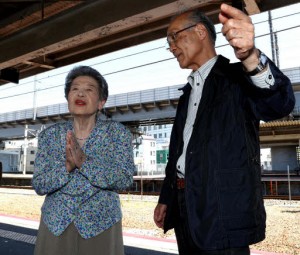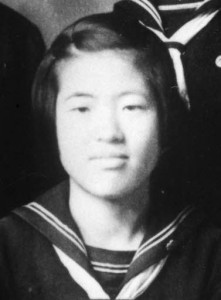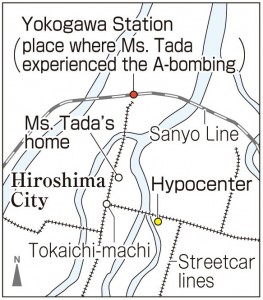Survivors’ Stories: Nobuko Tada, 87, Asaminami Ward
Jun. 5, 2017
Fulfilled mother’s last request by raising younger brother
by Miho Kuwajima, Staff Writer
Nobuko Tada (née Tanaka), 87, lost her parents and her younger sister in the atomic bombing. Back then, her brother Hidetoshi Tanaka, who survived the bombing and is now 74, had just turned two years old. The burden of taking care of her little brother fell on Ms. Tada’s 15-year-old shoulders.
Before the war, her parents ran a glass shop in Nishihikimido-cho (now part of Naka Ward). Back then, Ms. Tada was a fourth-year student at Hiroshima First Municipal Girls’ School (today’s Funairi High School). On the morning of August 6, 1945, she had a day off from the factory where she was mobilized to work for the war effort, so with her younger brother, she was planning to go to Midorii village (now part of Asaminami Ward), where her father’s parents had lived.
They left home and boarded a train that was departing from Yokogawa Station (now part of Nishi Ward), on the Kabe Line, at 8:15 a.m. The moment a bell sounded, signaling their departure, everything went black. They were 1.6 kilometers from the hypocenter. Ms. Tada remembers her brother, who she was carrying on her back, calling attention to the smoke. She then frantically fled the train with her brother, and they walked on to Midorii. They finally arrived at her relatives’ home that evening.
On the morning of August 7, Ms. Tada’s mother, Mineko, 37 at the time, was brought there, too. She had suffered severe burns to her upper body and looked like a completely different person. Ms. Tada recognized the grape patter on her mother’s blouse, but her eyelids and lips were swollen. She heard that her mother had been exposed to the atomic bomb at the Tokaichi-machi streetcar stop. She escaped by crawling through the flames and was loaded onto a truck and then brought to Midorii.
Ms. Tada’s brother was scared and would not approach, saying she was not his mother. All Ms. Tada could do was fearfully hand water to her as she begged for a drink.
That same evening, Ms. Tada’s younger sister, Yoshie, who was 12 and a first-year student at Hiroshima First Municipal Girls’ School, was found dead and then brought to the house in Midorii. Ms. Tada remembers her saying, “I’ve borrowed your pair of monpe (traditional Japanese work pants).” Then she left for Zaimoku-cho (now part of Naka Ward), located near the hypocenter, to help tear down houses to create a fire lane. She lost her life when the bomb exploded overhead, along with about 540 first- and second-year students from Hiroshima First Municipal Girls’ School who perished that day.
“I’m leaving Hidetoshi with you.” With these last words, Ms. Tada’s mother died of her injuries on August 9. The bodies of her mother and her sister were cremated by the side of the river. Her father was probably killed instantly when the bomb exploded. His remains were discovered later where the house had once stood, around the location of the bath.
Ms. Tada’s grief continued. Sumiko, her elder sister, was beset by poor health and died in 1953 at the age of 26, likely because she had been searching for her father in the city center and was poisoned by the bomb’s radiation.
Even today, Ms. Tada sometimes dreams about her mother, who had been in good health. She was good at cooking and embroidering and enjoyed cutting the three sisters’ hair. She also enjoyed joking around with her children and making them laugh. Ms. Tada recalls the splendid feast that she prepared, inviting relatives, too, to celebrate her brother’s birthday two months before the atomic bombing.
But the war shattered her happy family. Afterward, Ms. Tada gave up the idea of attending school and a relative, who was worried about her future, recommended that she marry her cousin. So Ms. Tada married at the age of 17. She had two children of her own, but her younger brother, who had lost his parents, was often reduced to tears as a result of bullying by other kids in the neighborhood. Still, Ms. Tada was faithful to her mother’s last request and raised him with care, just like her own children.
After her younger brother graduated from Hiroshima University, he joined Toyo Kogyo (now Mazda Motor Corporation). After working in the United States and other places, he taught at Hiroshima University and Yasuda Women’s College. Ms. Tada said, “It may be because our parents have been watching over us.” But the pain she experienced because of the atomic bombing, when a happy life abruptly vanished, has never healed.
Teenagers’ Impressions
Sensing her perseverance
Ms. Tada, who lost her parents in the atomic bombing and had to raise her little brother, was unable to attend school when they reopened sometime after the war ended. It was a tough life for a teenage girl, and if I were in her position, I think I would run away. Ms. Tada’s life was turned upside down by the atomic bombing. Hearing her tell her story, I sensed the perseverance that enabled her to survive those difficult conditions. (Yui Morimoto, 13)
Never repeat the tragedy
Ms. Tada looked happy when she told us about playing with her sisters and enjoying her mother’s jokes. But then her face fell as she explained how she lost her parents in the atomic bombing and then got married at the age of 17. The grief she experienced as a result of losing precious family members and those happy times is beyond my imagination. It’s such a cruel experience and I have to tell others about it so a tragedy like that will never happen again. (Kana Okino, 17)
(Originally published on June 5, 2017)
by Miho Kuwajima, Staff Writer
Nobuko Tada (née Tanaka), 87, lost her parents and her younger sister in the atomic bombing. Back then, her brother Hidetoshi Tanaka, who survived the bombing and is now 74, had just turned two years old. The burden of taking care of her little brother fell on Ms. Tada’s 15-year-old shoulders.
Before the war, her parents ran a glass shop in Nishihikimido-cho (now part of Naka Ward). Back then, Ms. Tada was a fourth-year student at Hiroshima First Municipal Girls’ School (today’s Funairi High School). On the morning of August 6, 1945, she had a day off from the factory where she was mobilized to work for the war effort, so with her younger brother, she was planning to go to Midorii village (now part of Asaminami Ward), where her father’s parents had lived.
They left home and boarded a train that was departing from Yokogawa Station (now part of Nishi Ward), on the Kabe Line, at 8:15 a.m. The moment a bell sounded, signaling their departure, everything went black. They were 1.6 kilometers from the hypocenter. Ms. Tada remembers her brother, who she was carrying on her back, calling attention to the smoke. She then frantically fled the train with her brother, and they walked on to Midorii. They finally arrived at her relatives’ home that evening.
On the morning of August 7, Ms. Tada’s mother, Mineko, 37 at the time, was brought there, too. She had suffered severe burns to her upper body and looked like a completely different person. Ms. Tada recognized the grape patter on her mother’s blouse, but her eyelids and lips were swollen. She heard that her mother had been exposed to the atomic bomb at the Tokaichi-machi streetcar stop. She escaped by crawling through the flames and was loaded onto a truck and then brought to Midorii.
Ms. Tada’s brother was scared and would not approach, saying she was not his mother. All Ms. Tada could do was fearfully hand water to her as she begged for a drink.
That same evening, Ms. Tada’s younger sister, Yoshie, who was 12 and a first-year student at Hiroshima First Municipal Girls’ School, was found dead and then brought to the house in Midorii. Ms. Tada remembers her saying, “I’ve borrowed your pair of monpe (traditional Japanese work pants).” Then she left for Zaimoku-cho (now part of Naka Ward), located near the hypocenter, to help tear down houses to create a fire lane. She lost her life when the bomb exploded overhead, along with about 540 first- and second-year students from Hiroshima First Municipal Girls’ School who perished that day.
“I’m leaving Hidetoshi with you.” With these last words, Ms. Tada’s mother died of her injuries on August 9. The bodies of her mother and her sister were cremated by the side of the river. Her father was probably killed instantly when the bomb exploded. His remains were discovered later where the house had once stood, around the location of the bath.
Ms. Tada’s grief continued. Sumiko, her elder sister, was beset by poor health and died in 1953 at the age of 26, likely because she had been searching for her father in the city center and was poisoned by the bomb’s radiation.
Even today, Ms. Tada sometimes dreams about her mother, who had been in good health. She was good at cooking and embroidering and enjoyed cutting the three sisters’ hair. She also enjoyed joking around with her children and making them laugh. Ms. Tada recalls the splendid feast that she prepared, inviting relatives, too, to celebrate her brother’s birthday two months before the atomic bombing.
But the war shattered her happy family. Afterward, Ms. Tada gave up the idea of attending school and a relative, who was worried about her future, recommended that she marry her cousin. So Ms. Tada married at the age of 17. She had two children of her own, but her younger brother, who had lost his parents, was often reduced to tears as a result of bullying by other kids in the neighborhood. Still, Ms. Tada was faithful to her mother’s last request and raised him with care, just like her own children.
After her younger brother graduated from Hiroshima University, he joined Toyo Kogyo (now Mazda Motor Corporation). After working in the United States and other places, he taught at Hiroshima University and Yasuda Women’s College. Ms. Tada said, “It may be because our parents have been watching over us.” But the pain she experienced because of the atomic bombing, when a happy life abruptly vanished, has never healed.
Teenagers’ Impressions
Sensing her perseverance
Ms. Tada, who lost her parents in the atomic bombing and had to raise her little brother, was unable to attend school when they reopened sometime after the war ended. It was a tough life for a teenage girl, and if I were in her position, I think I would run away. Ms. Tada’s life was turned upside down by the atomic bombing. Hearing her tell her story, I sensed the perseverance that enabled her to survive those difficult conditions. (Yui Morimoto, 13)
Never repeat the tragedy
Ms. Tada looked happy when she told us about playing with her sisters and enjoying her mother’s jokes. But then her face fell as she explained how she lost her parents in the atomic bombing and then got married at the age of 17. The grief she experienced as a result of losing precious family members and those happy times is beyond my imagination. It’s such a cruel experience and I have to tell others about it so a tragedy like that will never happen again. (Kana Okino, 17)
(Originally published on June 5, 2017)










